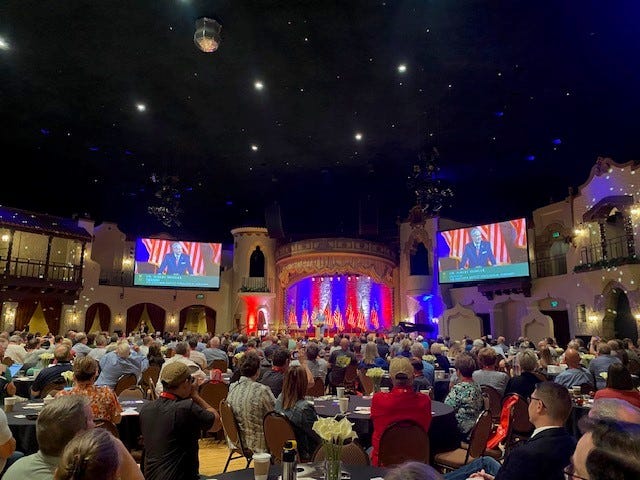What I heard and saw at a "Life and Liberty" forum at the Southern Baptist Convention
Christian nationalism. It was Christian nationalism. And also a social movement renegotiating its ultimate goals in order to sustain motivation and commitment.
On Monday afternoon on June 10th, I attended the Danbury Institute’s “Life & Liberty Forum” held in downtown Indianapolis. It was one of many activities happening during the Southern Baptist Convention’s annual meeting. The goal of the forum was to “explore topics surrounding life and liberty and especially how churches can change the course of a country.”
The speaker line up included some names you might recognize: Albert Mohler, president of the Southern Baptist Theological Seminary; Sam Brownback, former Ambassador for International Religious Freedom during the Trump administration; and even Trump himself, albeit virtually. Trump ended up not joining…1
The overall message of the forum was that this country is on a path to destruction and there is a spiritual and leadership vacuum in the US. The only hope is for pastors and religious leaders taking the fight over the “sanctity of life” and “religious liberty” into the public sphere.
The work being done in churches is not enough. In order to truly fulfill their duty they must take America back by battling the culture wars.
I put quotes around those two phrases because it is abundantly clear that this Forum and its speakers are operating with particular definitions (and particular Christian theological assumptions) for both sanctity of life and religious liberty.
This highlights the foundational nature of Christian nationalism to these discussions—Christian nationalism is a cultural framework that desires a particular expression of Christianity be fused with American civic life and for the government to vigorously defend and uphold that framework as central to who and what the United States is.2
But the “Christian” of Christian nationalism carries with it a load of extra cultural baggage—it doesn’t just refer to historic theological beliefs associated with Christianity like the divinity of Jesus or the trinity. This isn’t just about being able to sign on to the ancient creeds.
Rather, the “Christian” of Christian nationalism brings with it a host of cultural assumptions and views. This extra cultural baggage that gets lumped in with “Christian” was on full display at the forum.
For instance, let’s look at “sanctity of life.” The remarks throughout the forum used “sanctity of life” to refer to babies, embryos, and fertilized eggs. Mohler, in his comments, referenced a SBC resolution he and Andrew Walker proposed aimed at IVF and how a “true” pro-life worldview would seek to ban the practice. Regarding the resolution, Mohler quipped that “we are about to find out how pro-life the pro-life movement really is.”
The fall of Roe, Mohler stated, was not a pro-life victory, but one step on a path to ultimate pro-life victory. IVF, for instance, turns the embryo into a “consumer product” and results in the “alienation of reproduction” from the conjugal activities of heterosexual married couples. He claimed it is an “assault on human dignity.” And, sans evidence, he stated that a majority of the market for IVF is from non-heterosexual couples.3
Tom Ascol, speaking later during a panel focused on sanctity of life, defined the true pro-life movement as working toward making the “murder of anyone, to be illegal for anyone, regardless of circumstances.” The “regardless of circumstances” tends to mean opposition to abortion exceptions for rape or incest.
Ascol’s views are mirrored across the US population. The figure above draws from the 2021 General Social Survey and shows the percent of folks who oppose abortion across various circumstances. Respondents who embrace Christian nationalism4 are more likely to signal opposition across all situations compared to the full sample.
What remained unsaid was whether outlawing capital punishment or reducing instances of police violence toward minority communities or an expanded social safety net could fit within that definition of pro-life. The short answer would be, “no.”
When we survey the American public it is clear that folks who embrace Christian nationalism tend to define themselves as “pro-life” and definitely oppose abortion, but are generally more supportive of capital punishment, the use of violence by police, and other forms of violence at the hands of authority figures.5
In the 2021 GSS we see those who embrace Christian nationalism are much more likely to consider themselves pro-life and favor the death penalty for those convicted of murder. When it comes to the government improving the standard of living for poor Americans or helping folks pay medical bills, there’s less support.
So “sanctity of life” means very particular things. It doesn’t apply to capital punishment, or police violence, or expanding the social safety net. And the cultural framework of Christian nationalism, where “Christian” carries with it extra cultural baggage—like “pro-life” as it is defined in this particular way—helps draw boundaries around how this group sees itself, where it wants to see the country go, and how it believes we should all get there.
Beyond the empirical data above, I want to also share the experience of being in the room. During the “sanctity of life” panel that Ascol was on, Natalie Bowman began to list the various ways churches can and should come alongside women who might be seeking an abortion. Bowman, who was a social worker in Texas for several years, is now the director of pro-life policy at Danbury.
She shared how churches should support the local pregnancy help center, mentor these women and share the gospel with them, recognize they will likely have needs due to poverty and homelessness, drug and/or alcohol issues, lack of family support, other children they have might be in foster care, churches could support foster families, more Christians could engage the need by choosing to foster, churches and Christians could partner with local agencies to create emergency kits, they could create meal trains for foster families every time a child is placed with a new family. . .
As Bowman kept listing these legitimate needs she had first-hand experience with, it felt like the air was sucked out of the room. Energy was flagging. As the myriad challenges of being “comprehensively pro-life” were listed, and rightfully so (I applaud Bowman for getting into the nitty gritty here), the crowd was not really into it.
The experience in the room was that folks attending the forum can get jazzed up for call to generally “fight the culture war!” and other sound bytes (like an earlier joke about Elizabeth Warren and Pocahontas that drew some laughs), but when it comes to meeting the needs of real life people. . .well, that’s just not as exciting. It sounds like actual. . .well. . .work.
The final take-away for me was watching those on the front-line of the pro-life conservative movement redefine the end-goals of that movement in wake of a victory that many imagined would never come—the fall of Roe v. Wade.
Social movement theorists talk about this necessity within any social movement as it ages: will it become institutionalized and what will happen when it’s end goal comes to pass.
The March of Dimes is a good example of this. Originally founded to combat polio, it had to redefine its purpose after the polio vaccine effectively negated its reason for existence. Soon after polio was eradicated, the purpose for its existence was expanded and now the March of Dimes is billed as a “nonprofit organization that works to improve the health of mothers and babies.” The new purpose is broad enough as to never (likely) go away. It successfully navigated its achievement of a previous movement goal.
The Pro-Life movement in the US is in the midst of a similar process. The words of Ascol, Mohler, and others made clear that they do not see the fall of Roe as any sort of victory, but as I reported above, just one step on a path to victory. They were intent on making clear to the rank-and-file that the Pro-Life movement has won nothing of substance but must rather continue to take steps to ensure the “clear teachings of the Bible” are enacted in American public life.
What are they aiming at now? During this forum they discussed the “abortion industry” making the abortion pill available across state lines, the necessity of outlawing IVF, and ensuring those in their ranks also oppose abortion under any circumstances.
While I did not hear anyone say it out loud, I would not be surprised if outlawing various forms of contraception, if not all forms, also fall under possible future plans.
Overall it was a really interesting and helpful experience and I’m grateful I had the opportunity to listen and learn more.
Two Hot Takes - Rated by Spiciness
Number 1: Tim Lee, a former Marine and long-time evangelist, kicked off the festivities. In many ways, he was a perfect encapsulation of an Ambassador of Christian nationalism. His speaking style is a steady stream of consciousness peppered with claim after claim that the founding fathers wanted to put Christianity in our government and that this country was, is, and should continue to be, unapologetically “Christian.”
Lee supported his claims by referencing where various Christian symbols exist in Washington, D.C., inscriptions on monuments, our coins, etc.
The really wild moment, for me at least, was when he made the case for Christopher Columbus as a piece of evidence that God desired Christianity to guide our land. Lee pointed to “Christ” in Columbus’ name, read a quote from Columbus about how God was guiding the voyage, and how he was sent by God to build this part of the world.
I’m not exaggerating. Columbus discovering the New World was proof we should be a Christian nation.
Baptizing Columbus (again) as proof we were meant to be a Christian nation is definitely a take. What, with the raping, pillaging, and genocide and all.
I rate the “Columbus proves we’re a Christian nation” take as a 4 out of 5 habanero peppers hot take.
Number 2: Mohler, when discussing religious liberty, noted we’re in the midst of a massive crisis of which we may never recover. No hot take there.
(Wait for it. . .)
The “Left,” Mohler claimed, has not been able to enact their vision for the country through legislation, which is obviously the only way to truly govern. . .
(Here it comes. . .)
Rather, they had to rely on the courts to see their vision through and this is proof they have corrupted the American experiment.
(There it is!!!)
Given the recent victory of the pro-life movement with the fall of Roe v. Wade was due to legislation passed through the hard work of those like Mohler . . . oh wait, hold on folks, I’m just receiving word here. . .
*presses finger to earpiece*
Oh right, the fall of Roe v. Wade was due to *checks notes just to be sure* action taken by the courts!
This is a decently hot take from Mohler. Accusing the “Left” of capitalizing on a political reality that both the political left and right are routinely guilty of is pretty rich.
I rate this take as a 2.5 out of 5 habanero peppers.
Recent good news
American Idolatry was awarded the 2023 Gold Medal book award for Religion from Foreword Reviews! It is such an honor to receive recognition like this. I am so grateful. Thank you to those who have read, shared, and reviewed the book online6. I hope it continues to find its audience.
Until next time—onward, together!
Just before the Forum Adam Wren reported that Trump would not attend live but recorded a message that would be played. In the remarks Trump apparently does not mention the word “abortion.”
See American Idolatry for more.
I really wish he cited data, though given my experience in these settings, empirical evidence for broad claims isn’t of the highest priority. The claim could be correct, but I’ve been unable to find any studies from the US that show the proportion of those seeking IVF broken out by heterosexual versus other family types. In the UK (which some of the speakers pointed to as an example of political and religious conservatism’s failure), it appears 90% of all couples seeking fertility treatments were heterosexual. Given there are many more heterosexual couples in the US, I’m doubtful that the majority of people seeking IVF treatment are from same gender couples. If anyone can find recent numbers for the US I’ll update the post.
Using the 2021 GSS Christian nationalism respondents are those who strongly agreed or agreed with EITHER statement, “The federal government should advocate Christian values” or “The success of the United States is part of God's plan.”
Sam Perry and I cover this in Taking America Back for God.
You haven’t reviewed it online yet? Please take a couple minutes to do so! It helps so much.









It really feels like they are returning to their Confederate roots.
The SBC is a joke. They exist just to have an enemy.